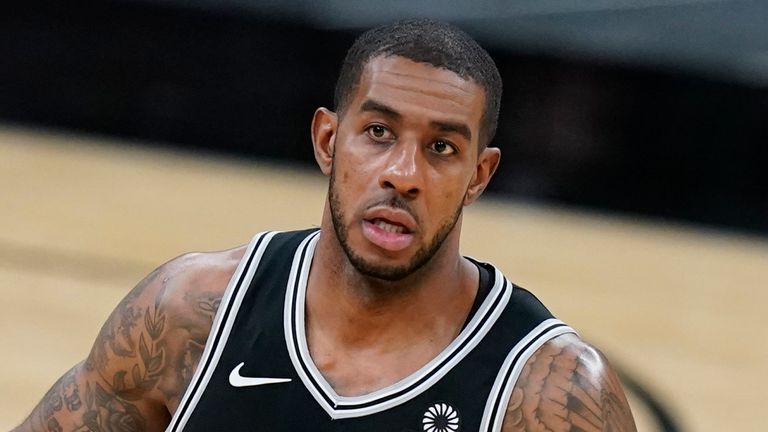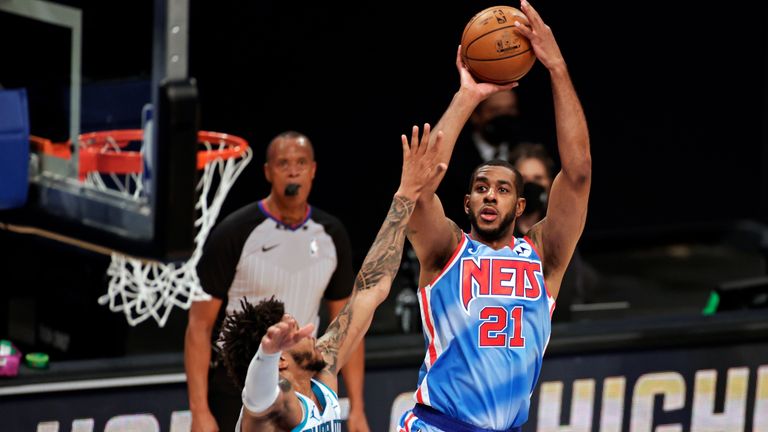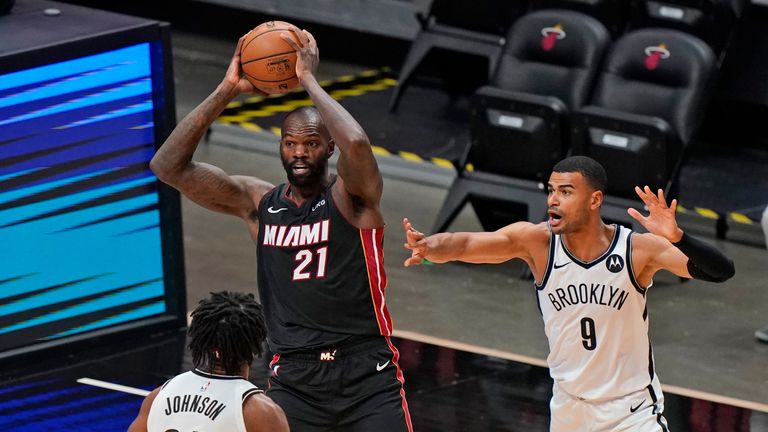LaMarcus Aldridge retirement will hurt Brooklyn Nets, but they will both survive – and that’s what matters
Watch Brooklyn Nets @ New Orleans Pelicans live on Sky Sports Main Event and Arena from 12:30am in the early hours of Wednesday morning.
Tuesday 20 April 2021 13:10, UK
LaMarcus Aldridge’s NBA career was plagued by interrupted momentum. And on cue, just as his elite career was finally back on a path to championship contention this season after being picked up by the Brooklyn Nets, cruel fate once again struck the forward-center and ended any opportunity that will fall to a team that is likely to be Finals-bound in the next few years.
For the unaware, Aldridge was forced into retirement due to a worrying flare-up of his Wolff-Parkinson-White (WPW) syndrome during a game. According to Shannon Brown of Basketball News, who also suffers from the issue, WPW is an extra electrical pathway in the heart that causes irregular heartbeats.
After hitting 8,059 field goals - the second most in the NBA during the past 15 years - to score 19,951 points and grabbing 8,478 rebounds, Aldridge posted on social media that the attack in his 1,029th game was one of the scariest things he’s experienced, and said: “I’ve made the difficult decision to retire from the NBA.”
There is a long history of big-bodied basketball players suffering from heart issues, going back to Jerry West, through to Larry Bird, and more recently Chris Bosh, but Aldridge has been forced into retirement before picking up a championship ring.
He was first diagnosed during his rookie season in 2007 with the Portland Trail Blazers. The shock to his system caused Aldridge to miss the last eight games of the season, but alongside fellow rookie Brandon Roy, the duo turned a 32-50 team around to win 41 games the following year.
Trending
- Tottenham vs Liverpool LIVE! & highlights
- Bournemouth win 3-0 at Man Utd for second season running LIVE!
- Leicester 0-3 Wolves highlights
- Chelsea squander chance to go top with frustrating Everton draw LIVE!
- World Darts Championship LIVE! Searle wins as Cullen storms out of presser
- Fulham 0-0 Southampton highlights & rate the players!
- Bournemouth stun Man Utd in Christmas nightmare for Amorim
- Man Utd latest: Neville says Rashford could go in January
- World Darts Championship schedule: Anderson headlines Sunday's action
The pair became franchise cornerstones and won 54 games in 2008-09 but were knocked out in the first round of their first playoff appearance. Everyone agreed they would be back: Roy’s silky perimeter ball handling, shooting and an ability to stop on a dime that you see more today in the game of James Harden; and Aldridge’s good screens while popping for a deadly mid-range jump-shot, or torturing good defenders in the post with a turnaround fadeaway that ranks as one of the best ever. They were leading the rising team of the moment and were shaping up to be a future championship contender.
The following season saw Roy miss nearly 20 games due to bad knees, so the Blazers slipped in the standings slightly and failed to get out of the first round again. Then a complete lack of cartilage in those knees meant Roy played just 47 before being forced into retirement, which set back Portland’s development, and Aldridge’s hopes of winning it all during that run.
Seeking success in San Antonio
Portland’s losing seasons helped them reload with better draft picks that resulted in Damian Lillard, who made an immediate impact. In their second season together, the Blazers won 54 games and reached the conference semi-finals. After similar success in 2014-15, the franchise started investing more in Lillard as the up-coming star, and Aldridge was keen to search for a more immediate championship opportunity in San Antonio after the Spurs had won it all in 2014.
The plan was obvious. Join a contender with an ageing roster, and learn about the system under the wing of the greatest power forward of all time, Tim Duncan. Then as he, Manu Ginobili and Tony Parker relinquish control and retire in the ensuing three years, continue the franchise’s long-standing tradition of winning 50 games every year alongside Kawhi Leonard, one of the best small forwards in the league, and continue to fight for championships.
It was all going to plan. While the Spurs were being out-paced by a historic Golden State Warriors that won 73 games in 2016, Aldridge was the second-leading scorer on a 67-win team. But when he and Leonard needed support in the conference semi-finals, the older legs of Parker, Ginobili and Duncan, not to mention other 33+ year-olds David West, Andre Miller and Boris Diaw, didn’t have enough in them to run with the young, athletic Oklahoma City Thunder.
A year later, the Spurs were again just a handful of wins behind a 67-win Warriors team and had their number in the opening game of a Western Conference Finals clash with a Golden State team that arguably had greater talent than a year earlier.
After scoring 62 points with a 20-point lead in the first half of Game 1, the Spurs look dangerous. But three minutes into the third quarter, Warriors center Zaza Pachulia stepped beneath Leonard on a jump-shot, which would not just be the end of the small forward’s season, but would wipe out the majority of the next year.
In dispute with the front office, Leonard wanted out in 2018, and without a running mate, nor the veteran leadership of Duncan, Ginobili and Parker, Aldridge had some frank conversations with head coach Gregg Popovich about their future together.
Popovich told Sky Sports: “We were just honest with each other, that’s just the way we do things. There was no smoke and mirrors. There were certain reasons for feeling the way he did and I think I said at the time that I thought some of it was justified. We talked about it; we had dinner. We just laid it all out and in the end, we figured out that we were not going to pursue the trade because he didn’t want to do that anymore. It was just a situation where a coach and player talked things through and came to a decision. It’s as simple as that.”
The next two years saw the Spurs enter a rebuild, and during the pandemic-plagued season of 2020, Aldridge had shoulder surgery as the playoff contenders entered the Florida bubble - missing out on a chance to help his team make a post-season run.
The time helped San Antonio make the decision to focus on youth. They might have missed the playoffs for the first time in 23 years, but giving Jakob Poeltl and Drew Eubanks more opportunities, as well as Keldon Johnson and Luka Samanic, more minutes to develop meant that Aldridge was taking another step back in his career.
A buyout seemed like a good option, as it gave the big man a chance to join a title contender, and the Brooklyn Nets seemed like the most sure thing in the league in this tumultuous season.
Brooklyn bound to net a ring
It made sense on paper. Yes, the Brooklyn Nets had just signed Blake Griffin, but he is a little undersized and had lost a lot of the explosive ability that helped him make his name. Other options at that position on the roster include DeAndre Jordan, who has the size to disrupt on defense but has offered little on offense and instead fills up a lane, which doesn’t play to the strengths of their star trio James Harden, Kevin Durant and Kyrie Irving.
Jordan’s production got to the point where second-year center Nico Claxton was outplaying the former Lob City dunk machine. But nearly 73 per cent of Claxton’s shots come from within five feet of the basket, which again takes up space that’s needed for some of the best players on the team.
This is why Aldridge was so key for the team. The Nets have depth, and while he wasn’t filling a need on the defensive end, he created space and could be a threat on offense while offering some defense on the low block for the likes of Joel Embiid, Bam Adebayo or Clint Capela.
Aldridge made a career off mid-range, turnaround fadeaways, but in recent seasons he has taken a step further back each year to the point where he is a legitimate threat from three-point territory. In five games with the Nets he scored 12 points, grabbed four rebounds, assisted two of his team-mates and blocked two shots per game. As part of that, he was shooting 80 per cent from distance, and 54 per cent of his shot attempts were from at least 10ft away from the rim.
Maybe Brooklyn have enough firepower to win a championship, but Aldridge would have been a key piece in the Finals. He could have been a key piece had any of the teams’ momentum not been interrupted.
When the announcement came, Gregg Popovich paid tribute to Aldridge and said: "He’s had a long great career, and he’s going to be fine financially and he’ll have a lot of good memories, but your health is what makes you tick. I’m just hoping for the best.
"He was a great team-mate. He played good basketball for us and participated in the community. He had a great sense of humour. He’s just a really nice guy. His play on the court sustained us and helped us get a good number of wins, but it comes time for everybody."
Aldridge still had a year or two of good productivity left in his game, but luck and timing were never on his side - whether it was due to his own health or that of his team-mates - when it came to taking the final step towards winning it all.
At this stage of Aldridge’s life, however, health is more important than anything. His career numbers speak for themselves, and his biggest win might be feeling like he can walk away from the game without an overwhelming need to risk his life chasing a ring.




